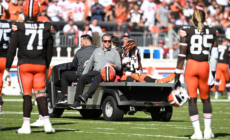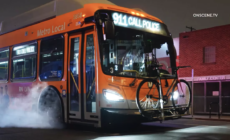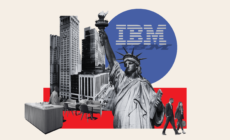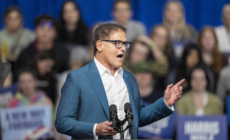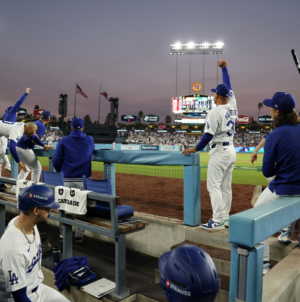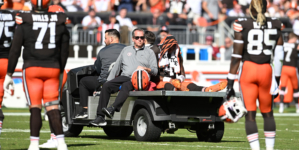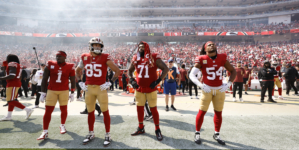-
MLB Playoffs: Dodgers Eliminate Mets, Will Face Yankees in World Series - 5 mins ago
-
Jeff VanderMeer Talks About His New ‘Southern Reach’ Novel - 6 mins ago
-
Browns’ Myles Garrett, Jameis Winston Slam Fans For Celebrating Deshaun Watson Injury - 41 mins ago
-
John Kinsel Sr., Navajo Code Talker During World War II, Dies at 107 - 49 mins ago
-
49ers All-Pro Ejected After Punching Chiefs Player - about 1 hour ago
-
Starring in Kamala Harris’s Closing Argument: Donald Trump - 2 hours ago
-
Series of small Southern California earthquakes occur off Catalina - 2 hours ago
-
IBM Hopes ‘Spectacular’ New NYC Office Will Entice Employees Back to Work - 2 hours ago
-
Liam Payne Vigil in London Brings Fans Together - 2 hours ago
-
Powerball winner in Lake Elsinore was one away from the big prize. Here’s how much they won - 2 hours ago
Mercedes Installing Electric Vehicle Chargers at Starbucks in California
First Volvo, now Mercedes-Benz. The German luxury automaker has inked a deal with Starbucks to install a charging network for electric vehicle drivers along Interstate 5 in California.
Last year, the Swedish brand launched its partnership with an established charging route from Denver to Seattle.
The routes are equally as long, 1,400 miles.
Mercedes-Benz High-Power Charging, the branch of the company responsible for the implementation of the Mercedes-Benz-branded charging network, announced today the first phase of its 100-store nationwide Starbucks build out is underway.
That phase includes installing 400-kilowatt charging stations at Starbucks stores.
“The collaboration between two leading brands like Mercedes-Benz and Starbucks will uplift the charging experience for all EV drivers,” said Andrew Cornelia, President and CEO of Mercedes-Benz High-Power Charging in a press release.

Mercedes-Benz
“Together, we seek to infuse delight into this facet of EV ownership through intentional experiences that make drivers genuinely excited to plug in. We envision a future where charging your vehicle is as easy as enjoying your favorite Starbucks,” he said.
Most Volvo-branded Starbucks charging locations have two chargers with four total plugs. Mercedes plans to execute their I-5 initiative differently, saying, “The number of chargers available at each Starbucks store will depend on characteristics of the specific location, though we anticipate there will be four to 10 charging ports at each location.”
Like Volvo, the Mercedes High-Power Charging team is tasked with monitoring the operational end of the charging network. The company will, “continually monitor our network and ensure extremely high uptime,” a spokesperson told Newsweek.
Continual monitoring will lead to proactive and reactive maintenance, handled by a network of distributed operations and maintenance field technicians across the U.S. They can be dispatched to address urgent issues and will routinely visit each location to “meet or exceed all preventative maintenance requirements specified by the manufacturer, site host, municipality or other industry standards,” the spokesperson detailed.
“We’re seeing a paradigm shift in how we think about charging. The baseline expectation is safe, reliable, accessible charging for all EV drivers. Beyond that, our focus is to curate a delightful experience for all customers,” Cornelia told Newsweek.
“What drivers do while they charge will be as important as the charging itself. By extending the Mercedes-Benz brand promise beyond the vehicle, we’re making charging as easy and seamless as ordering a cup of coffee,” he said.
Mercedes-Benz High-Power Charging has been operating charging stations in the U.S. since November when the first one opened in Atlanta, Georgia. More than a dozen locations are now in service across the Southern U.S. in Texas, Alabama, Georgia, Florida, South Carolina, Tennessee, and Kentucky.
Previously, the company announced a partnership with Simon Property Group to install charging locations at dining and shopping destinations, and at Buc-ee’s convenience store locations.
The company expects to expand to nearly half of the U.S. states in the next 12 to 18 months as part of a $1 billion initial investment in public charging infrastructure.
Mercedes refused to give details about its use of government incentives to help fund this initiative, instead providing a statement saying, “The support through public funding is important to build up nationwide charging infrastructure. Where and when it makes sense for our network, we welcome the opportunities offered by federal, state, and utility programs aimed at increasing the availability of public charging in communities that need this critical infrastructure.”
“At Starbucks, we have a long history of bringing renewable and clean energy projects to connect communities that lack this infrastructure,” said Michael Kobori, Starbucks chief sustainability officer. “Partnering with Mercedes is the next step in expanding our EV charging network so our customers can refuel sustainably while they enjoy Starbucks.”
Late last year, Newsweek was one of the first to test out the partnered Volvo and Starbucks charging network.
Uncommon Knowledge
Newsweek is committed to challenging conventional wisdom and finding connections in the search for common ground.
Newsweek is committed to challenging conventional wisdom and finding connections in the search for common ground.
Source link




